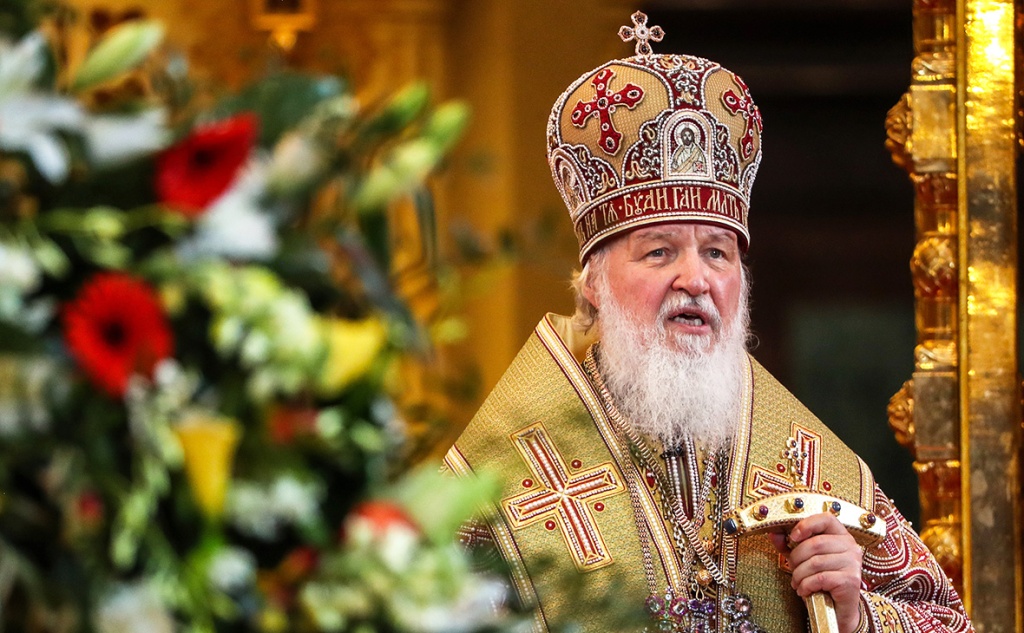Patriarch Kirill Sees Russia’s Future in Unity of Common People and Elites
Vera Kholmogorova
RBC
November 1, 2017
Kirill, Patriarch of Moscow and All Russia, outlined his vision of Russia’s future. According to the patriarch, it consists in the complementarity and unity of the elites and common people.

The unity of the common people and elites is the future of Russia, argues, Kirill, Patriarch of Moscow and All Russia. He discussed this during a meeting of the World Russian People’s Council, reports our correspondent.
“Russia is now looking for a vision of the future. I think the vision of the future is a vision of the common people and a vision of the elite achieving complementarity. The elites and common people should be indivisible, a single principle and single whole,” he said.
The patriarch stressed, however, it was “impossible to artificially appoint an elite.” According to him, it had to be educated,” just as the common people had to be educated.
“If we do not educate our own common people, others will develop them,” warned the head of the Russian Orthodox Church.
Patriarch Kirill also said Russia had “acquired immunity to all forms of political radicalism” in the one hundred years that had passed since the events [sic] of 1917.
“Russia has enough strength to remain an island of stability. Our society is now consolidated. The tragic civic split [that existed in 1917] does not exist,” he stressed.
According to the patriarch, “we can rejoice in unification and reconciliation” and “be an example and support for all those who want to survive the current global crisis.”
“The common people are not naturally inclined to revolution,” he argued.
The 21st World Russian People’s Council was held on November 1 in Moscow’s Christ the Savior Cathedral. The event’s stated topic was “Russia in the 21st Century: Historical Experience and Prospects for Development.” It was attended by Patriarch Kirill, clergymen, MPs, and public figures.
Should You Sue for Wages?
Russians Don’t Believe They Should Fight for Their Labor Rights: How Wrong They Are
Pavel Aptekar
Vedomosti
November 1, 2017
Economic turmoil has not only made Russian workers uncertain of the future but also indifferent to violations of their labor rights, e.g., wage arrears, increases in the length of the work day, and the absence of holidays. Workers rarely file complaints with courts and oversight bodies, fearing not only a negative reaction from management but also closure of their companies due to inspections by the state. However, in some cases, appealing to the courts for help is a quite effective means of defense.
According to a survey conducted in June 2017 among 1,600 workers over the age of eighteen in thirty-five Russian regions by the Center for Social and Political Monitoring at RANEPA’s Institute of Social Sciences, violations of labor rights are not uncommon. In practice, nearly half of the workers surveyed (42%) had encountered them. The most common violations were wage arrears (24.1%), changes in work schedules (22.5%), and failure to provide paid leave or refusal to pay it (13.1%).
Meanwhile, the apathy of workers who encounter violations has increased. The percentage of those who did not seek redress for violation of their rights has increased from 49.7% of those polled in 2006 to 54.4% of those polled in 2016–2017. Workers have lost faith in nearly all means of rectifying situations. The percentage of those who complained to management had dropped from 41% to 36.7%; to a trade union, from 8% to 5.1%; to the courts, from 7.4% to 4.1%; and to the civil authorities, from 6.7% to 2.9%.
The unwillingness of employees to protect their rights reflects the idleness of most Russian trade unions, but it does seem to make sense to appeal to the courts, at least in the case of nonpayment of wages.
According to the Supreme Court’s ajudication department, the number of such complaints has been constantly increasing. In 2007, there were 350,242 such complaints; in 2013, 459,016 complaints; and in the first six months of 2017, 243,861 complaints. Moreover, in the absolute majority of complaints (95.7–97.5%) the courts have found for the plaintiff. The situation is the other way around when it comes to suits against unlawful dismissals. In 2007, the courts ruled for plaintiffs in 10,525 of 17,934 lawsuits or 58.7% of all cases. In 2013, plaintiffs won 7,124 of 14,953 lawsuits or 47.6% of all such cases. In the first six months of 2017, the courts ruled in favor of plaintiffs in 1,748 of 4,316 lawsuits or 40.5% of all cases.
The results of the survey reflect the growing apathy of Russians in crisis conditions and fear of losing their jobs, explains Andrei Pokida, director of the Center for Social and Political Monitoring and co-author of the study. Some workers fear a negative reaction if they hang dirty laundry out to dry. If they do complain, they complain only to management. Other workers fear a complaint filed with state agencies could lead to an inspection, resulting in the closure of the company for violations. The reluctance to defend their rights is also caused by a lack of legal literacy among many workers and low incomes. Not all of them are capable of putting together the paperwork for a lawsuit, the services of lawyers are expensive, and many workers simply believe violations are the norm, explains Pyotr Bizyukov from the Center for Social and Labor Rights.
Translated by the Russian Reader. The emphasis in the first article is mine.
Discover more from The Russian Reader
Subscribe to get the latest posts to your email.
One thought on “Common People”